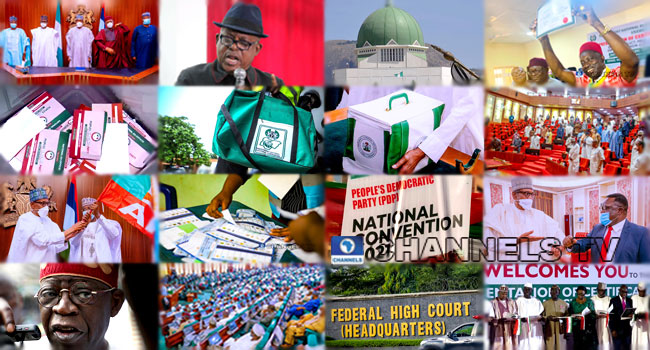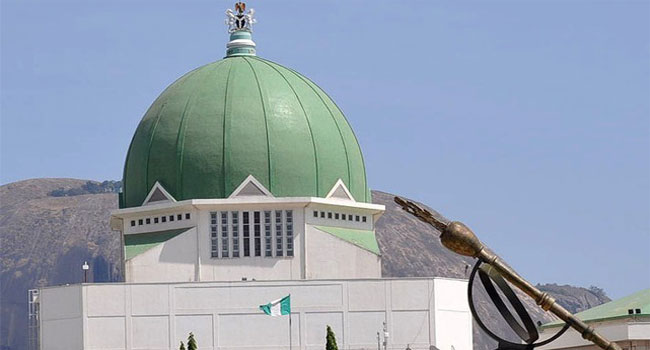
The 2021 political year has been quite eventful, and there is no way a recap can be done without talking about the crises that hit some political parties, the congresses, the defections, and the frustrations in the bid to redefine the nation’s political space as it relates to the amendment of the Electoral Act, among others.
It all began with the congresses at the ward and state levels in the All Progressives Congress (APC) and Peoples Democratic Party (PDP) amid the series of crises in various organs of these parties.

Before the congresses, Mr Uche Secondus, who served as the PDP National Chairman, was engulfed in a corruption scandal that snowballed into a series of litigations. He was later suspended from his position by a court.
READ ALSO: TB Joshua, Sound Sultan, Attahiru, And Other Prominent Nigerians Who Died In 2021
Secondus remained suspended while the main opposition party conducted its national congress which elected Mr Iyorchia Ayu, a former Senate President, as its new national chairman, as well as 20 other national officers in October to give the party a new set of National Working Committee.
This meant that Secondus did not complete his tenure in office, but the new NWC was inaugurated about a month after the election.

The APC, on its part, was also hit with some crises, including the call for the sack of Yobe State Governor, Mai Mala Buni, as the acting APC National Chairman over allegations that he cannot hold such a position as a sitting governor.
He, however, enjoyed the support of the party’s leaders while APC has fixed February 2022 to conduct its national congress. The All Progressives Grand Alliance (APGA) also had its fair share of the squabbles, especially in the build-up to the governorship election in Anambra State.
Critics Turned Allies
In the quest to succeed Governor Willie Obiano, a former governor of the Central Bank of Nigeria (CBN), Professor Charles Soludo, emerged the flagbearer of APGA, but not after a hard-fought battle over the party’s ticket. He went on to win the election and he will be sworn-in in 2022.

In the middle of the crisis, the PDP lost two of its governors who defected to the APC. Governor Ben Ayade of Cross River State was the first to join the ruling party while his Zamafara State counterpart, Bello Matawalle, dumped the opposition party about a month later.
On September 16, one of the most vocal critics of President Muhammadu Buhari, Femi Fani-Kayode, announced a shocking defection to the APC. While most people did not see it coming, Fani-Kayode – a former minister of aviation, had said he would rather die than join the ruling party.
Another significant occurrence in 2021 was the passage of the Electoral Act Amendment Bill by the National Assembly which attracted many commendations. But the feat would be incomplete until President Muhammadu Buhari signs the bill into law.

A similar bill was passed in 2018, but the President rejected it thrice. The third time, he cited the closeness to the 2019 general elections as the reason for his refusal to sign the bill.
About three years after the President’s action, the National Assembly made further attempts to improve the nation’s electoral process.
In what could be described as a bow to pressure, the lawmakers amended the Act to allow the Independent National Electoral Commission (INEC) to decide the mode of transmission of election results, and propose the direct primary mode for political parties, among others.

Buhari’s Successor
Thirty days after receiving the bill from the National Assembly, President Buhari informed the lawmakers that he has decided to withhold his assent because of the direct primary clause which he said would cost the country a lot of resources.
In their reaction, the lawmakers resolved to properly address the issue when they resume from their recess. Meanwhile, the National Assembly passed and forwarded the 2022 Appropriation Bill to the President.

The lawmakers raised the total budget figure from the N16.391 trillion proposed by President Buhari to N17.126 trillion. While the Electoral Act Amendment Bill suffered a setback in 2021, the year ended with the signing of the budget into law, to allow Nigeria continue on the part of a January to December budget cycle.
But in assenting to the bill, the President faulted the ‘worrisome changes’ by the National Assembly and promised to revert to the lawmakers with a request for an amendment.

As Nigerians look forward to a promising 2022 political year, political players and parties would be preoccupied with activities to get a successor for President Buhari who completes his second term in 2023.
While key political players in the North and South continue to eye the highest office in the land, there are rumours that the leader of the APC, Bola Tinubu, will join the contest to become the next president, although he has yet to officially declare his interest.

